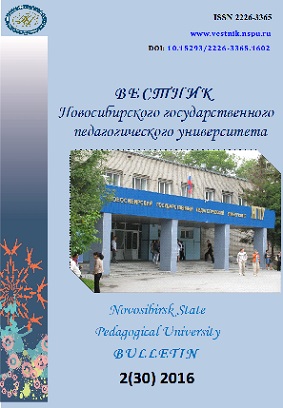Полипарадигмальность жанра в зеркале предпочтений современной лингвистики (из опыта анализа online-петиций как особой разновидности эпистолярных текстов)
Multiparadigmatic character of the petition genre in the mirror of modern linguistics (an analysis of online-petitions as a special
kind of epistolary texts)
Author(s): Anna Vladimirovna KurjanovichSubject(s): Philology
Published by: Новосибирский государственный педагогический университет
Keywords: Genre; epistolary; multiparadigmatic approach; mass media communication; electronic epistolary text; оnline petition
Summary/Abstract: The article focuses on the multiparadigmatic approach in modern linguistic studies as a complex system of methodological principles. This principle is intended to use the latest achievements of various language disciplines for the purpose of quantitative and qualitative “augmentation” of the problem field and obtaining more well-grounded results. The aim of this paper is to analyze the multiparadigmatic potential of the complex epistolary genre. This form of texts is in demand in the space of contemporary interpersonal and social communication. The materials of the study are online petitions – messages addressed to representatives of the re-gional and national authorities, which are expressed in a variety of electronic epistolary texts of social orientation. Online petition is a unique empirical textual basis that permits to research in-to various fields of the humanities: from the standpoint of modern media-linguistics, semiotics, psycholinguistic theories of mass communication, speech influence and linguistic identity, cer-tain aspect of discourse analysis and stylistic research within the framework of psychological, sociological and pragmalinguistics, rhetoric and speech culture theories. The Multiparadigmat-ic character of the epistolary genre can be conceptualized in ontological and epistemological aspects. On the one hand the epistolary genre is a multi-discourse, multi-functional multi-code form. On the other hand it is a reproducible text model crammed with clichés. Hence, epistemo-logically the genre requires an adequate complex approach. The conclusion is that the effec-tiveness of modern linguistic studies depends on appropriate use of multiparadigmatic ap-proach based on a comprehensive analysis of linguistic facts from the perspective of various humanitarian fields and schools, applying various methods and techniques of research.
Journal: Вестник Новосибирского государственного педагогического университета
- Issue Year: 6/2016
- Issue No: 2
- Page Range: 150-159
- Page Count: 10
- Language: Russian

